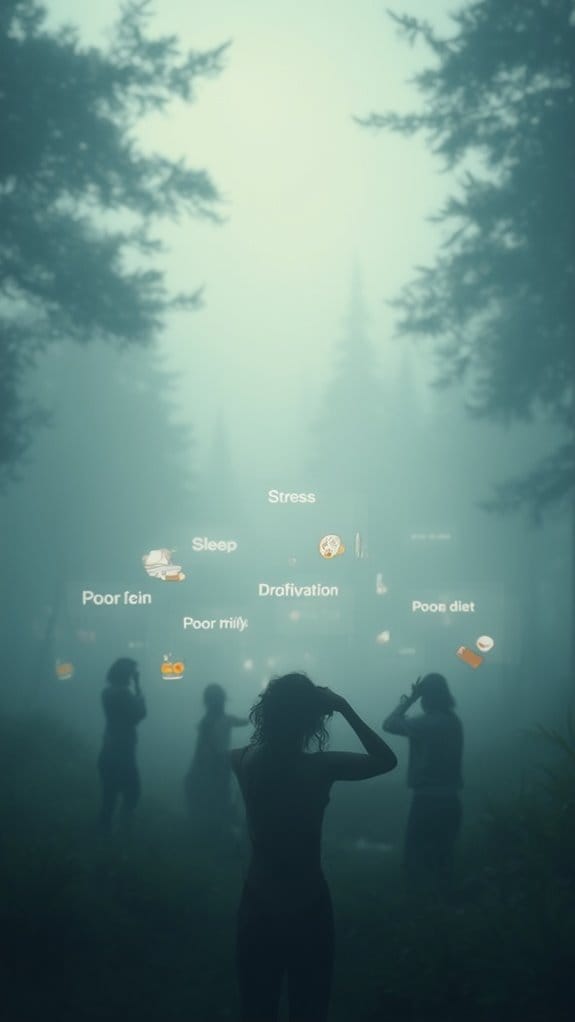The Silent Signs of Brain Fog Every Woman Should Know
Do you often feel forgetful or struggle to focus? These are silent signs of brain fog that every woman should know. It can sneak in during stressful times, hormonal changes, or lack of sleep, leaving you mentally drained. Think about your hydration and nutrition; are you fueling your brain properly? If daily tasks start feeling overwhelming, it might be time to seek help. Curious about what else could be affecting your clarity? Let's explore further!
Key Takeaways
- Memory lapses and forgetfulness are common indicators of brain fog, affecting daily tasks and cognitive clarity.
- Difficulty concentrating or completing tasks can signal underlying cognitive challenges that require attention.
- Increased mental fatigue, especially after minimal effort, can suggest cognitive overload or nutritional imbalances.
- Emotional distress, such as overwhelming sadness or anxiety, may accompany brain fog and impact daily functioning.
- Changes in sleep patterns or quality can contribute to brain fog, emphasizing the need for rest and recovery.
Understanding Brain Fog: What It Is and Why It Matters

Have you ever found yourself staring blankly at a page, as if your brain took an unexpected vacation? You’re not alone! This puzzling phenomenon is called brain fog, and it can really mess with your cognitive clarity.
Imagine trying to think, but your thoughts feel like they're stuck in quicksand. That’s brain fog for you! It can cloud your focus, leaving you frustrated and yearning for mental freedom.
Understanding brain fog is essential for maintaining brain health. It often stems from stress, lack of sleep, or poor nutrition—factors we can control. By recognizing its presence, you empower yourself to take action.
Simple changes, like staying hydrated or practicing mindfulness, can clear that mental haze and ignite your mental spark. So, next time you feel foggy, remember: your brain deserves some TLC. Embrace the journey to clarity, and watch how your thoughts take flight!
Common Symptoms: Recognizing the Signs

Have you ever walked into a room and completely forgotten why you went there?
If you’re finding it tough to concentrate on tasks or feeling mentally drained, you might be experiencing some common symptoms of brain fog.
Recognizing these signs is the first step toward clearing that mental haze and getting back to your sharp self.
Memory Lapses and Forgetfulness
When you find yourself staring blankly at your phone, trying to remember why you walked into a room, you’re not alone. Memory lapses and forgetfulness can sneak up on anyone, especially when life gets busy. It’s frustrating, right?
But there’s hope! You can explore memory improvement techniques like keeping a journal or using visual reminders. Ever tried mnemonic devices? They can be game-changers!
Cognitive enhancement strategies, such as regular exercise and mindfulness, can also boost your brainpower. So, don’t just shrug it off! A little effort can make a big difference.
Difficulty Concentrating on Tasks
Memory lapses can often lead to another frustrating experience: difficulty concentrating on tasks. You know those moments when your mind feels like a jumbled mess? It’s like trying to read a book with the pages stuck together!
To regain your focus, consider using focus techniques like the Pomodoro Technique, where you work in short bursts followed by breaks. This can help your mind reset. Additionally, mental exercises such as puzzles or memory games can sharpen your concentration over time. They’re fun and effective!
Increased Mental Fatigue
Feeling like your brain's been running a marathon without you? That’s mental exhaustion creeping in, a telltale sign of increased mental fatigue. You might find simple tasks feel like climbing Everest.
When your mind's juggling too much—work, family, social commitments—it leads to cognitive overload. Ever notice you can’t focus on one thing without zoning out? Or maybe you’re forgetting little details that used to be second nature.
These symptoms aren't just annoying; they signal your brain's asking for a break. So, if you’re feeling drained and your thoughts are tangled, it’s time to pause.
Rediscovering your mental clarity might just mean giving yourself the freedom to rest and recharge. Remember, your mind deserves some TLC too!
The Impact of Hormonal Changes on Cognitive Function

Have you ever noticed that your focus seems to slip during certain times of the month?
Hormonal changes can really shake things up and impact your brain health, especially throughout your menstrual cycle.
Understanding how these fluctuations affect your cognitive function might help you make sense of those foggy moments.
Hormones and Brain Health
As you navigate through life, you may not realize just how much your hormones influence your brain health. Hormonal fluctuations can hit your cognitive function like a surprise wave, leaving you feeling foggy or unfocused.
Ever wonder why you sometimes forget where you put your keys or struggle to concentrate? Those hormonal changes, especially during key phases of life, can really affect how clearly you think.
This cognitive impact isn’t just annoying; it can disrupt your daily flow and decision-making. Understanding this connection empowers you to take charge.
Menstrual Cycle Effects
While you mightn't always connect the dots, your menstrual cycle can greatly impact how you think and feel throughout the month. Those hormonal fluctuations aren’t just about cramps and cravings—they can cloud your brain, too!
You might find it hard to focus or feel a bit forgetful, especially during the days leading up to your period. Ever notice how your motivation dips when those menstrual cramps kick in? It’s all linked to the ebb and flow of hormones.
Embracing this knowledge can empower you to navigate these changes better. So, next time you feel a bit foggy, ask yourself: Could my cycle be playing a role? Recognizing this connection could be your key to reclaiming clarity and freedom.
Lifestyle Factors Contributing to Brain Fog

Sometimes, you might find yourself staring blankly at your screen, struggling to focus, and wondering why your brain feels like it's wading through molasses.
Believe it or not, your lifestyle plays a huge role in how clear your mind feels. Are you getting enough quality sleep? Lack of rest can fog up those mental gears. Physical activity is another game-changer; a quick walk can boost your brainpower.
Your lifestyle significantly impacts mental clarity; prioritize sleep and physical activity for a sharper mind.
Don't forget hydration levels—dehydration can dull your sharpness faster than you think. If you’re glued to screens for too long, it might be time to take a break.
Social interactions can also lift your mood and clarity, so reach out to friends! Your dietary habits matter, too; a balanced diet fuels your brain.
Finally, mindfulness practices can help you center yourself amid chaos. What changes will you make today to reclaim that mental clarity?
Nutritional Deficiencies and Their Role in Mental Clarity

You might be surprised to learn that what you eat can greatly impact your mental clarity.
Ever notice how your brain feels foggy after a heavy meal? That’s often due to nutritional imbalances. When your diet lacks essential vitamins, you might experience brain fog and sluggishness. Nutritional balance is key for keeping your mind sharp.
Are you getting enough B vitamins, omega-3 fatty acids, and antioxidants? These nutrients play a crucial role in brain function.
Vitamin deficiencies can lead to forgetfulness and confusion, leaving you frustrated. Imagine trying to chase your dreams while your mind feels hazy!
Stress and Anxiety: The Hidden Triggers

Stress and anxiety can creep into your life like an unwanted guest, leaving you feeling overwhelmed and, yes, foggy.
Have you noticed how those racing thoughts can blur your focus? It’s like trying to see through a foggy window. You mightn't even realize that stress is the culprit behind your brain fog.
Racing thoughts can cloud your focus, making it hard to see clearly—stress might just be the hidden culprit.
Effective stress management is essential for clarity. When you’re juggling a million things, it’s easy to let anxiety take the wheel.
But don’t let it! Consider simple practices like deep breathing or a quick walk to help with anxiety reduction.
When to Seek Help: Consulting a Professional

Feeling overwhelmed by stress and anxiety can really cloud your thinking, but how do you know when it's time to reach out for help?
It’s essential to prioritize your mental health and recognize the signs that you might need a professional’s guidance.
Here are three key indicators:
- Persistent Brain Fog: If your cognitive clarity doesn’t improve with rest, it might be time for a cognitive assessment.
- Daily Functionality Issues: Struggling to complete everyday tasks, like focusing at work or managing relationships, can signal a deeper issue.
- Emotional Distress: If feelings of sadness or anxiety are overwhelming, don’t hesitate to consult a mental health professional.
Frequently Asked Questions
Can Brain Fog Be a Sign of a Serious Medical Condition?
Absolutely, brain fog can signal underlying conditions you shouldn’t ignore.
It’s not just about feeling a bit scattered; it can stem from causes like stress, sleep issues, or even nutritional deficiencies.
Have you noticed it affecting your daily life? If it’s persistent, it might be time to chat with a healthcare professional.
After all, understanding what's behind your brain fog can help you reclaim your mental clarity and freedom to thrive.
How Can I Differentiate Brain Fog From Normal Forgetfulness?
Differentiating brain fog from normal forgetfulness can be tricky.
If you’re experiencing frequent memory lapses that disrupt your daily life, it might be more than just a momentary lapse.
Think about whether you’re struggling to focus or if your cognitive clarity is clouded more often than not.
Are you forgetting important tasks or appointments regularly?
If so, it’s worth exploring further.
After all, you deserve to feel sharp and in control!
Are There Specific Age Groups More Affected by Brain Fog?
Brain fog prevalence can vary across age groups, but it’s often linked to age-related cognitive decline.
You might notice it more in adults over 40, as their brains face natural changes. But don’t worry! Everyone experiences this at times, regardless of age.
Have you ever felt scattered after a long day? It’s normal. Staying mentally active and managing stress can help.
Isn’t it nice to know you’re not alone in this?
Does Sleep Quality Influence the Severity of Brain Fog?
Absolutely, sleep quality plays a huge role in how you feel mentally.
When you face sleep deprivation, your cognitive performance can tank, leaving you foggy and unfocused. Ever notice how hard it's to think clearly after a restless night?
Your brain needs that quality rest to function at its best. So, if you want to shake off that brain fog, prioritizing good sleep could be your ticket to feeling sharp and alive again!
Can Brain Fog Be Temporary or Is It Always Chronic?
Absolutely, brain fog can be both temporary and chronic. You might experience temporary triggers like stress, lack of sleep, or poor diet. These can clear up with lifestyle changes.
However, chronic factors, such as underlying health issues, can keep you feeling foggy longer. Have you noticed patterns? Identifying what triggers your brain fog can help you reclaim your clarity and energy.
After all, who doesn’t want to think clearly and feel their best?
Conclusion
In the grand scheme of life, you know what they say: “You can't see the forest for the trees.” Brain fog can sneak up on you, making even the simplest tasks feel challenging. But by recognizing the signs and understanding the factors at play, you can reclaim your mental clarity. So, don’t brush it off—take charge of your health and well-being. After all, a clear mind leads to a brighter life! What’s your next step?








